Veterinary Sanitation
One of the key departments of the Faculty of Veterinary Medicine at KazNAU is the Department of Veterinary Sanitation. The department trains specialists in the following educational programs:
-
09102 – Veterinary Sanitation (Bachelor's),
-
09103 – Veterinary Food Safety and Technology (Bachelor's),
-
08201 – Livestock Product Technology (Bachelor's),
-
09102 – Veterinary Sanitation (Master's),
-
09102 – Veterinary Sanitation (Doctoral).
The primary mission of the department's staff is to prepare highly qualified, competitive specialists who meet contemporary requirements by improving the educational system. These specialists must be able to analyze societal challenges and make well-founded decisions.
Departmental Objectives:
In line with this mission, the department pursues the following objectives:
-
Training pedagogical staff capable of working in an innovative educational environment;
-
Integrating modern technologies into the educational process;
-
Preparing qualified specialists who meet the industry's standards.
Educational Process and Practice:
The courses offered by the department help develop skills in providing proper animal care and housing conditions. This contributes to improving the productivity of agricultural animals, preventing diseases, and evaluating food safety.
To enhance the competitiveness of students in the labor market, the department closely collaborates with leading production enterprises. For instance, with companies such as Dinara-Ranch LLP, Aidarbayev Farm, Amiran LLP, Adal LLP, Bayserke-Agro LLP, the Alma-Ata breeding farm, Alatau-Kus LLP, and Makinsk Poultry Farm LLP. At these enterprises, industrial and familiarization lessons are held for second-year students, while third- to fifth-year students participate in practical training. Students directly engage in the production process of various products.
The department staff actively engages in educational and methodological work. In recent years, several textbooks and teaching aids have been published under the initiative of the department, including:
-
"Veterinary Entrepreneurship" (Volume 1 and 2);
-
"Technology, Hygiene, Sanitation, and Veterinary Sanitary Examination of Meat and Dairy Products";
-
"Veterinary Sanitary Examination of Animal Raw Materials";
-
"Forensic Veterinary Sanitary Examination of Livestock Products";
-
"Veterinary Hygiene and Sanitation" and others.
Organization of the Educational Process
The lecture halls are equipped with modern interactive whiteboards, and the educational process is supplemented with video materials, visual aids, and presentations. This facilitates the easy and effective mastery of the material by students.
All lecture and laboratory-practical session materials for all subjects taught by the department are available on the Platonus 6.0 e-learning platform. This allows students to independently study the necessary materials and contact instructors with any questions.
In the department's laboratories, master's and doctoral students conduct scientific research, with their findings being published in various scientific journals.
Scientific and International Activities
The department's faculty actively participates in international and national scientific-methodological conferences, seminars, and regularly enhances their qualifications at universities both in Kazakhstan and abroad.
The department has established close cooperation with accredited laboratories, equipped with modern tools, where laboratory and practical classes for certain subjects are held.
Department staff actively participate in grant programs. In recent years, over 30 scientific articles by department members have been published in international journals indexed in Scopus and Web of Science databases.
International Cooperation
The department has established close ties with foreign institutions, including:
-
University of Warmia and Mazury (Olsztyn, Poland),
-
Latvia University of Agriculture (Jelgava),
-
Suleyman Demirel University (Turkey),
-
Saint Petersburg State Agrarian University.
Faculty members actively participate in international scientific conferences.
The department's students participate in various student olympiads annually and secure prize-winning positions. Additionally, they are awarded student scholarships from the N. Nazarbayev Foundation.
Material and Technical Base
The department is equipped with specialized classrooms intended for in-depth study of subjects included in the educational program.
Laboratories:
-
"Product Safety, Quality, and Veterinary Sanitary Expertise" teaching and research laboratory – room No. 231.
-
"Hygiene and Sanitation in Veterinary Control Objects" teaching and research laboratory – room No. 137.
-
"Radiobiology" teaching and research laboratory – room No. 217.
HISTORY OF THE DEPARTMENT
Given the significance of animal husbandry in our nation, efforts commenced to establish higher educational institutions within the agricultural sector to cultivate specialized professionals in agriculture. Consequently, in 1929, the Almaty Zootechnical-Veterinary Institute was inaugurated, marking the second such institution in the Republic's history. Within this institute, the departments of "Meat Processing" (1930) and "Zoohygiene" (1931) were duly established.
The esteemed Professor A.E. Lukin assumed the role of the founding head of the Department of Meat Processing. Subsequently, from 1935 to 1937, the department was capably led by E.I. Vasilets, followed by N.S. Nakonechny's tenure from 1937 to 1939. Professor V.I. Ryakhovsky then assumed the leadership of the department from 1939 to 1980. Under his able guidance, notable individuals such as K.E. Yedygenov, M.I. Zelinsky, E.F. Lozhkin, N.A. Zolotarev, and N.V. Kudrina successfully defended their doctoral dissertations.
The scientific research of the department in the 1930s included:
- studying the meat productivity of various breeds of camels bred in Kazakhstan (Professor A.Ya. Lukin);
- researching changes in sheep fat during storage under different environmental conditions (Associate Professor N.S. Nakonechny);
- comparative analysis of bacteriological and serological methods for studying the causative agent of Siberian plague in raw hides (A. Konanbayev, F.Kh. Musina).
Since 1950, the department has focused on studying:
- the chemical composition and morphology of meat from various animal species;
- the technology of livestock production and its veterinary and sanitary examination;
- effective methods of preserving animal products and raw materials;
- methods of disinfecting meat products in cases of certain infectious diseases.
Additionally, research was conducted on veterinary and sanitary examination in cases of brucellosis in cattle, infectious dermatitis in sheep and goats, as well as testing the quality of saiga meat.
In the 1970s, at the behest of the Ministry of Agriculture of the USSR and the Ministry of Agriculture of the Kazakh SSR, the department conducted an extensive research project on "Livestock slaughter in extreme conditions in arid and semi-arid regions of the country and preservation of products". Professor N.F. Shuklin led the department. The research yielded six author's certificates, eight regulatory documents, methods for primary processing of radiation-contaminated animals, and preservatives suitable for field conditions. These studies culminated in the successful defense of three doctoral and seven candidate dissertations.
From 1980 to 1987, Professor N.F. Shuklin continued to lead the department. Under his guidance, T.M. Teleugaliyev and S. Kyrykbayuly successfully defended their doctoral dissertations, while S. Kyrykbayuly, A.Zh. Sakharjanov, N.A. Kosyntseva, A.M. Trush, N.N. Akhmetgaliyeva, D.B. Dzheksembiyev, and M.B. Sagimbekov defended their candidate dissertations
The Department of Zoohygiene was established in 1931 under the leadership of Professor A.V. Alikayeva. From 1937 to 1943, the department was headed by V.P. Pospelov, and from 1943 to 1963 by Associate Professor P.F. Romanov. Due to industry developments, the department's name changed: "Zoohygiene" (1931-1970), "Zoohygiene and Veterinary Sanitation" (1970-1980), "Zoohygiene of the construction and design of livestock facilities" (1980-1996).
From 1987 to 1996, Professor T.M. Teleugaliyev led the department, resulting in the publication of 125 scientific articles and the preparation of 5 textbooks and teaching aids.
In 1996, following the consolidation of the Almaty Zootechnical Veterinary Institute and the Kazakh State Agrarian University, the Department of Veterinary Sanitary Examination amalgamated with the Department of Zoohygiene, establishing the Department of Veterinary Sanitary Examination and Hygiene. The esteemed Doctor of Agricultural Sciences, Professor K.A. Sagyndikov, assumed the leadership of the department.
In 2006, a portion of the department pertaining to hygiene was integrated with biochemistry, resulting in the formation of the Department of Hygiene and Biochemistry under the proficient guidance of Professor Zh.B. Myrzabekov. Subsequently, in 2008, "Hygiene and Biochemistry" merged with the Department of Animal Feeding, leading to its renaming as "Hygiene, Sanitation, and Feeding".
In 2010, the department's name was changed to "Veterinary Sanitary Examination and Hygiene" under the leadership of Professor Zh.B. Myrzabekov. During this time, two doctoral and more than ten candidate dissertations were successfully defended.
Since 2011, Professor N.B. Sarsembayeva has been the head of the department. Under her guidance, two PhD dissertations were defended, and numerous scientific articles were published in international journals. Additionally, patents and author's certificates were acquired.
In the 2024-2025 academic year, the department provides high-quality training for veterinary specialists by 2 doctors of science, 6 candidates of science, 2 PhD doctors, 3 masters. The degree of full-time teaching staff (teaching staff) of the department is 52%, the average age is 49.2 years.
The department has successfully supervised the defense of eleven doctoral and thirty candidate dissertations. Our esteemed employees have contributed to the field by authoring over 65 textbooks, 60 methodological recommendations, and an impressive 700 scientific articles. Furthermore, the department holds more than 50 patents and copyrights.
Our research endeavors primarily focus on crucial aspects of animal product quality and safety, food safety, hygiene, and sanitation. The outcomes of our research are disseminated through publication in renowned international journals with high impact factors (Q1-Q4).
The department actively engages in international collaborations and facilitates internships for its employees at prominent foreign scientific institutions. Notably, through the "Bolashak" program, internships have been conducted at esteemed universities in Poland and Latvia.
Furthermore, the "Veterinary Sanitation" department, under the auspices of the Ministry of Science and Higher Education of the Republic of Kazakhstan, is currently undertaking three significant scientific projects:
1. Development of innovative feed additives derived from active shungite sourced from the Bakyrshik deposit, encompassing their pharmacotoxicological evaluation and comprehensive veterinary-sanitary assessment of poultry products resulting from their usage (2023-2025). This project is led by the esteemed Doctor of Veterinary Sciences, Professor Sarsembayeva N.B.
2. Development of synbiotic technology based on Kazakh minerals (zeolite, vermiculite) and probiotic strain (E.coli39-SN) for aquaculture and substantiation of their safety (2023-2025). Supervisor - Doctor of Veterinary Sciences, Professor Sarsembayeva N.B.;
3. Development of methods to reduce radioactivity in animal organisms and animal products (2023-2025). Supervisor - PhD, Associate Professor Abzalieva A.B. The department demonstrates an increase in the number of scientific publications by its employees.
In the academic year 2023-2024, 38 articles were published, 10 of which were in international journals with a non-zero impact factor, and 2 were in journals recommended by the Committee on Quality in Education and Science of the Ministry of Science and Higher Education of the Republic of Kazakhstan. Department employees have access to over 30,000 journals recognized by the scientific community. A utility model patent was obtained during the year.
The department is currently engaged in research activities with four doctoral candidates and nine master's students. We are committed to nurturing young talent, fostering industry partnerships, and maintaining fruitful collaborations with esteemed scientific institutions both domestically and internationally.
Through our academic mobility program, students have the opportunity to broaden their horizons by studying at partner universities abroad. For instance, during the 2023-2024 academic year, Kausar Hasan and Moldir Abibola successfully completed a semester at our esteemed international partner institutions.
Since its inception, the department has played a pivotal role in advancing agricultural production and scientific knowledge. Our dedicated faculty members have contributed significantly to the development of rural intellectual capital, driving positive socio-economic and cultural transformations within the Republic. Furthermore, we take pride in having educated numerous highly skilled professionals who have made substantial contributions to the agricultural sector.
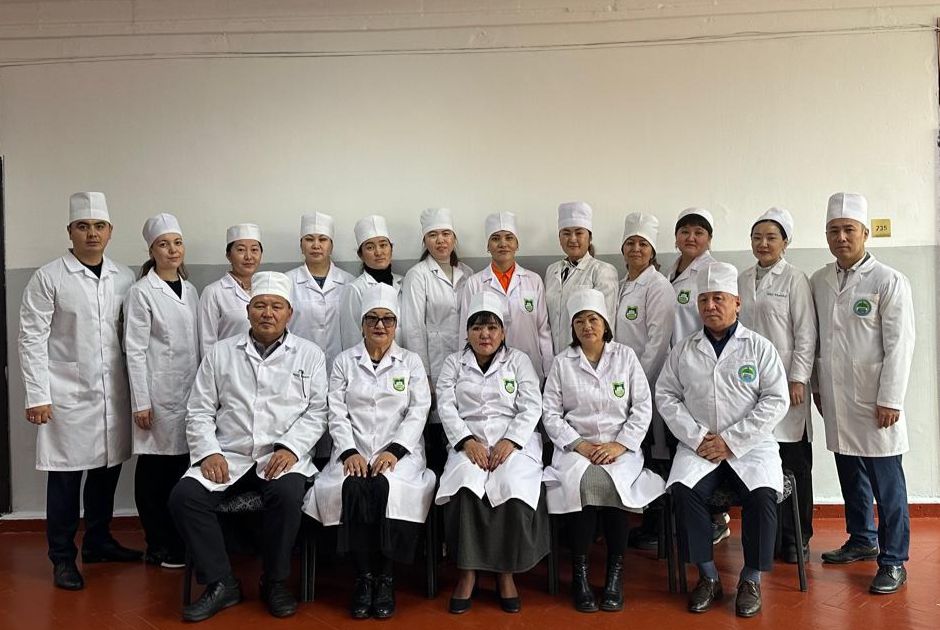
The staff of the department “ Veterinary sanitation ”
 (1).jpg)
Tokaeva Mereke, candidate of Veterinary Sciences, professor
Head of the Department
- Educational program
6_ОП 6В09104-Ветеринария 2024-2029.pdf
- Catalog of elective disciplines
- Graduate model
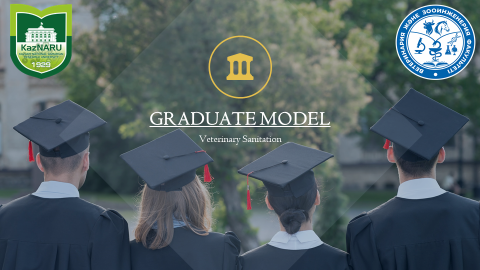
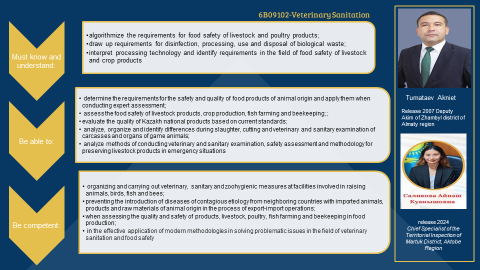
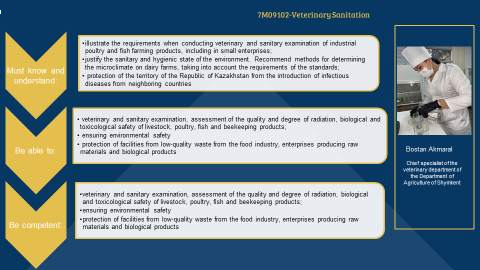
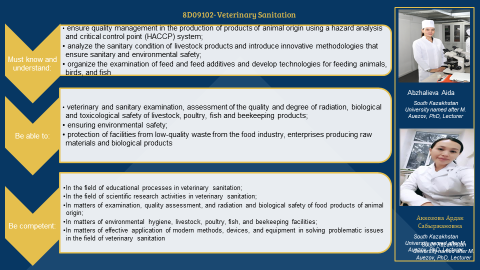
- An educational programm development plan
9_План развития ОП 6В09104-Ветеринария.pdf
- Practice (practice bases, main partners and dual training)
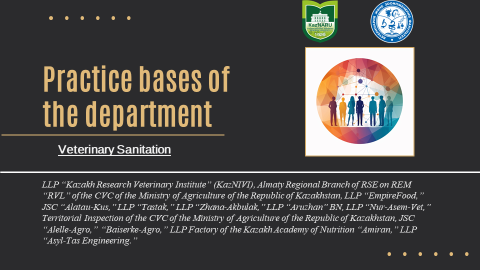
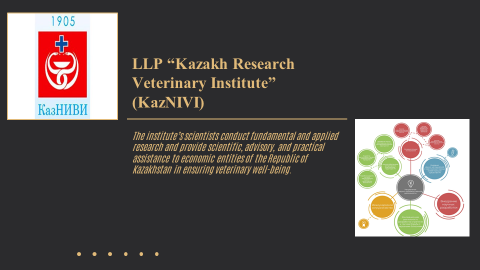
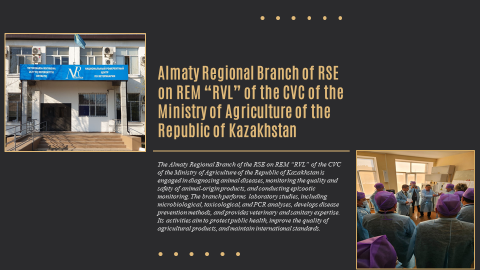
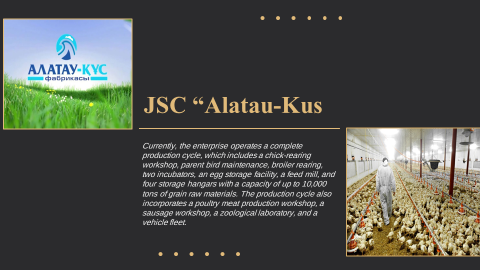
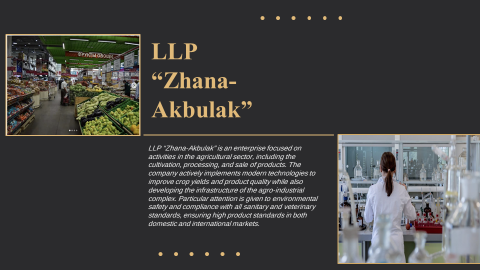
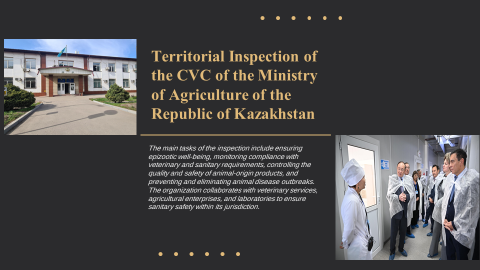
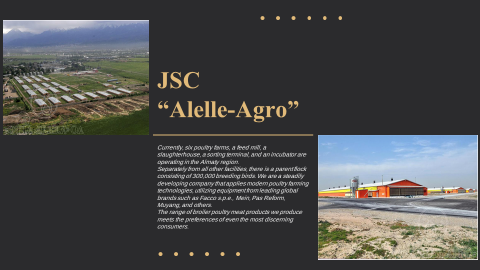
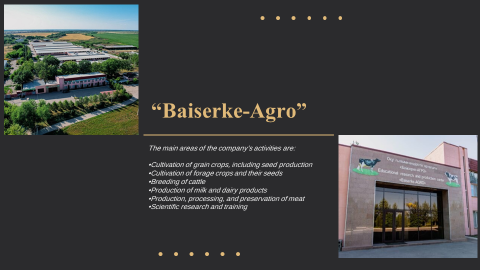
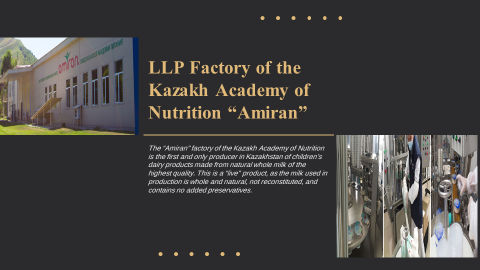
Educational and industrial practice of students of the Department of Veterinary Sanitation
Students' practical training is an important, integral part of the continuous educational process of the veterinary and sanitary doctors training system. This allows students to get acquainted with the veterinary and sanitary service, consolidate theoretical knowledge, identify shortcomings, and acquire the necessary practical skills.
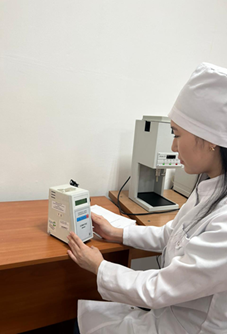
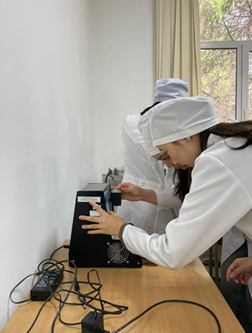
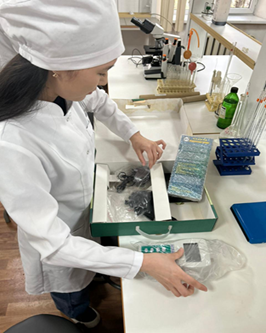
Laboratory "Examination of safety and quality of products and animal raw materials"
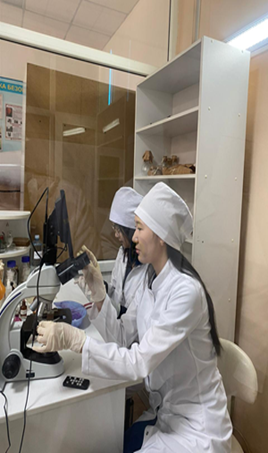
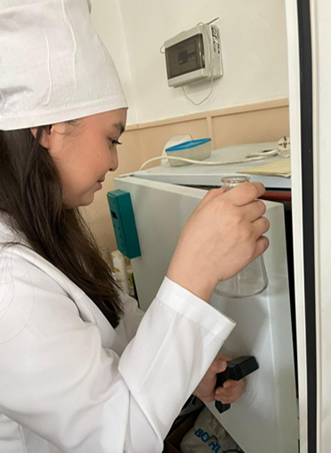
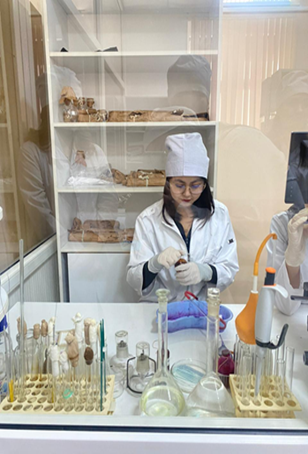
Scientific Research Laboratory of ʺhygiene and sanitation of the veterinary supervision facilityʺ
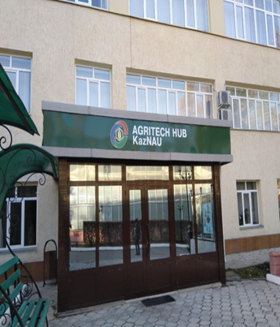
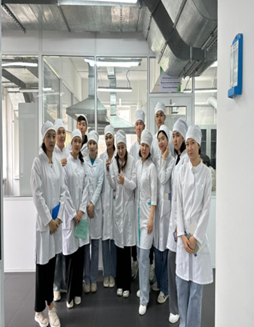
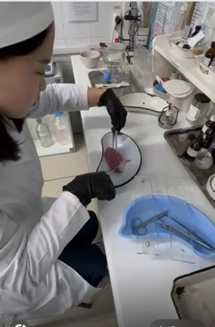
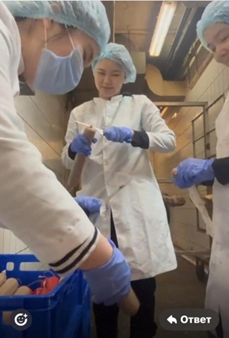
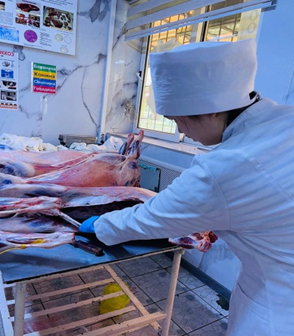
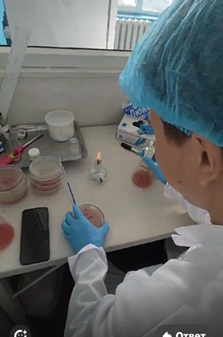
Alumni Association
Voluntary union of alumni, established on the basis of shared professional and ethical principles, aimed at fostering unity among graduates
The Mission of the Association - to unite graduates of all generations from the specialty to create a community that fosters the further development and prosperity of the department
The goals of the Association
- Development of contacts between alumni members of the Association;
- Providing assistance to graduate students on employment issues;
- Promoting the preservation and development of the best traditions of the department.
Work Plan veterinary sanitation
Topics of research work of the Department of Veterinary Sanitation for 2024-2025
|
№ |
AR number/project name |
Manager project |
Term |
Performers |
Institution |
Source of funding and type of competition |
Department |
|
|
Development and pharmacotoxicology of new feed additives based on active shungites from the Bakyrchik deposit and veterinary and sanitary assessment of poultry products when used |
Sarsembayeva N. |
01.02.2023-31.12.2025 |
Zarkhanova A |
NAO KazNAIU |
Ministry of Science and Higher Education of the Republic of Kazakhstan |
Veterinary sanitation |
|
|
Technological development and safety justification of synbiotics for aquaculture based on Kazakh minerals (zeolite, vermiculite) and probiotic strain (E. coli 39-SN) |
Sarsembayeva N. |
01.02.2023-31.12.2025 |
Zarkhanova A |
NAO KazNAIU |
Ministry of Science and Higher Education of the Republic of Kazakhstan |
Veterinary sanitation |
|
|
Development of a method of reducing radioactivity in the organism of animals and livestock production |
Abjalieva A. |
01.02.2023-31.12.2025 |
Musoev A.M Boranbaeva T Uzyntleuova A.D. Zarkhanova A.Zh Bazarbaev R.K |
NAO KazNAIU |
Ministry of Science and Higher Education of the Republic of Kazakhstan |
Veterinary sanitation |
Student research work
Articles of the Department of Veterinary Sanitation for 2023-2024
SCIENTIFIC PROJECTS AT THE DEPARTMENT OF “VETERINARY SANITATION” IN THE 2023-2024 ACADEMIC YEAR.
Articles of the Department of Veterinary Sanitation for 2024-2025
|
№ |
Author's full name |
Department, center, laboratory |
Article title |
Magazine titles |
Published date
|
Submitted for publication or will be published before the end of the year (submitted, under examination, correspondence with the editors, expected publication date) |
|
|
Aikerim Zhumabay, Assiya Serikbayeva, Aitbay Alimov |
кафедра |
The importance of camel milk and its dairy products – a review |
Potravinarstvo Slovak Journal of Food Sciences vol. 18, 2024, p. 77-96 https://doi.org/10.5219/1947 ISSN: 1337-0960 online www.potravinarstvo.com © 2024 Authors, CC BY-NC-ND 4.0. (Q3 CiteScore 44) |
2024 |
|
|
|
Gulnur Tanbayeva, Bakhyt Barakhov, Orynbay Tagayev, Zhaxylyk Myrzabekov, Primkul Ibragimov, Gulmira Alpysbayeva, Murat Kalmagambetov and Dinara Darbekovna Narbayeva |
кафедра |
Effectiveness of Antimicrobial Preparations for the Sanitation of the Udder of Dairy Cows |
International Journal of Veterinary Science Volume 13, No. 5, 2024, 647-654. (Q2 в WoS, 58 процентиль в Scopus) |
2024 |
|
|
|
G.E. Alpysbayeva, M.R. Turabekov, B.B. Barakhov, Zh.B. Myrzabekov, P.Sh. Ibragimov, O.O. Tagayev, K.D. Alikhanov, D.D. Narbayeva and A.A. Taipova |
кафедра |
Development of a Disinfectant Composition Based on Hydrogen Peroxide |
Engineered Science. – 2024. – Т. 28. – С. 1080. (Q1 в WoS, 98 процентиль в Scopus) |
2024 |
|
|
|
Zhumakayeva A. Tleulessov R. , Bakisheva Zh. , Dyussenov S., Akzhunussova I., Tokaeva M |
Кафедра |
Microbial composition of livestock buildings is the basis for the creation of a biological preparation to stabilize the microbial background |
Caspian Journal of Environmental Sciences, Vol. 22 No. 2 pp. 381-393 Received: Oct. 23, 2023 Revised: Dec. 06, 2023 Accepted: Feb. 13, 2024 DOI: 10.22124/cjes.2023.7347 |
2024 |
|
|
|
Sarsembaeva, Nurzhan |
кафедра |
"Composition of the microbiome of rainbow trout (Oncorhynchus mykiss) and Siberian sturgeon (Acipenser baerii) and options for its correction with probiotics / |
International Journal of Veterinary Science (ISSN: 2304-3075) |
2024 |
справка о принятии статьи. Статья планируется к публикации в декабре 2024
|
|
|
Moldagaliyeva, Dinara Sarsembaeva, Nurzhan Uzakov, Yasin Lozovicka, Bozhena
|
кафедра |
Probiotics in the creation of fish-based herodietic half-finished products
|
Potravinarstvo Slovak Journal of Food Sciences Q3, Pr. 45 |
2024 |
|
|
|
Moldagaliyeva D.Z.; Sarsembayeva, Nurzhan Uzakov, Yasin Malikovich Biyashev, Birzhan Salimgereyeva, Bagdat Zhanabaevna Baitilessova, Dinara Tussupova, Nurzhan Pravin, Nariman Kozhamseitova, Assel
|
кафедра |
Study on the Biological Drug Enterocol’s Effect on the Nile Tilapia Breeding
|
Open Agriculture Journal Q2, 54 |
2024 |
|
|
|
Apdraim G.; Sarsembayeva N.; Lozowicka B. |
кафедра |
Effect of vermiculite feed additive on the chemical, mineral, and amino acid compositions of quail meat Enhancing Animal Welfare and Immune Health: A Study on Hydrogen Peroxide and Iodine-based Disinfectants in Farms
|
Veterinary World Q1,82 |
2023 |
|
|
|
Turabekov M.R. Barakhov B.B. Myrzabekov Zh.B. Tagayev O.O. Ibragimov P.Sh. Alpysbayeva G.E. Narbayeva D.D. Alikhanov K.D.
|
кафедра |
Enhancing Animal Welfare and Immune Health: A Study on Hydrogen Peroxide and Iodine-based Disinfectants in Farms
|
Том 29 June Номер статьи 1095, Q1, 98
|
2024 |
|
|
|
Alpysbayeva G.E. Turabekov M.R. Barakhov B.B. Myrzabekov Zh.B. Ibragimov P.Sh. Tagayev O.O. Alikhanov K.D.
|
кафедра |
Development of a Disinfectant Composition Based on Hydrogen Peroxide
|
Engineered Science, Q1, 98
|
2024 |
|
|
|
Tanbayeva G.; Barakhov, Bakhyt Tagayev, Orynbay Myrzabekov, Zhaxylyk Ibragimov, Primkul Alpysbayeva, Gulmira Kalmagambetov, Murat Narbayeva, Dinara Darbekovna
|
кафедра |
Effectiveness of Antimicrobial Preparations for the Sanitation of the Udder of Dairy Cows
|
International Journal of Veterinary Science, Q2, 65 Т 13, V 5, Pg. 647 - 65415 |
August 2024 |
|
|
|
Aitpayeva Z.; Tagayev O. Smagulov D. Sidikhov B. Barakhov B.
|
кафедра |
Veterinary sanitary assessment of mutton after application of antihelminth feed additive with albendazole
|
Brazilian Journal of Biology Т. 842024 |
2024 |
|
виртуальный помощник
